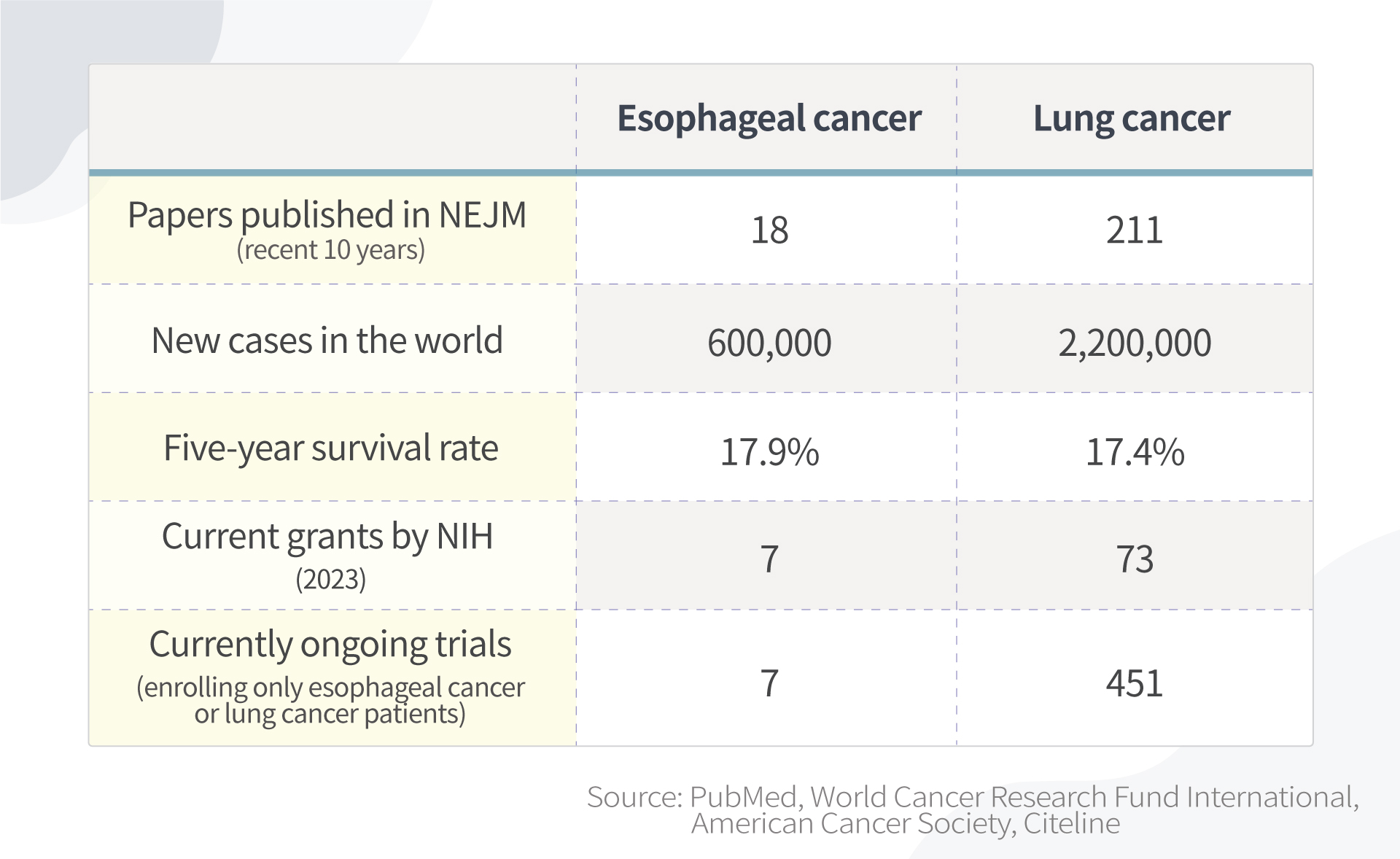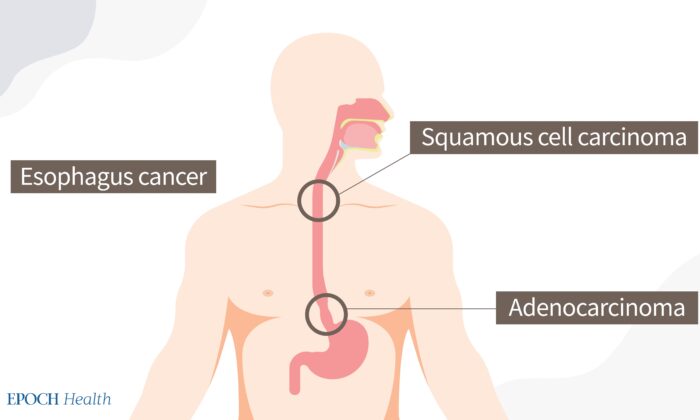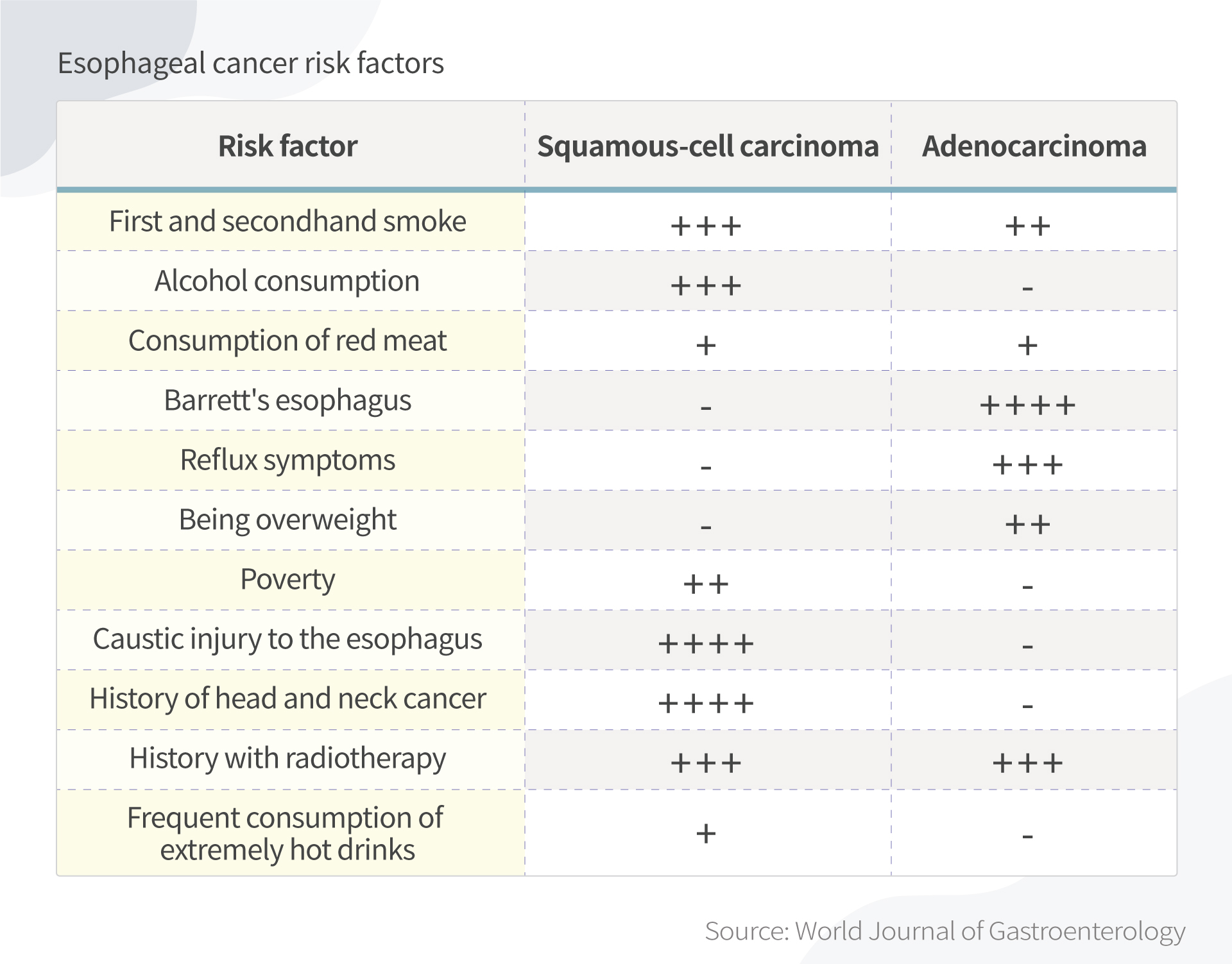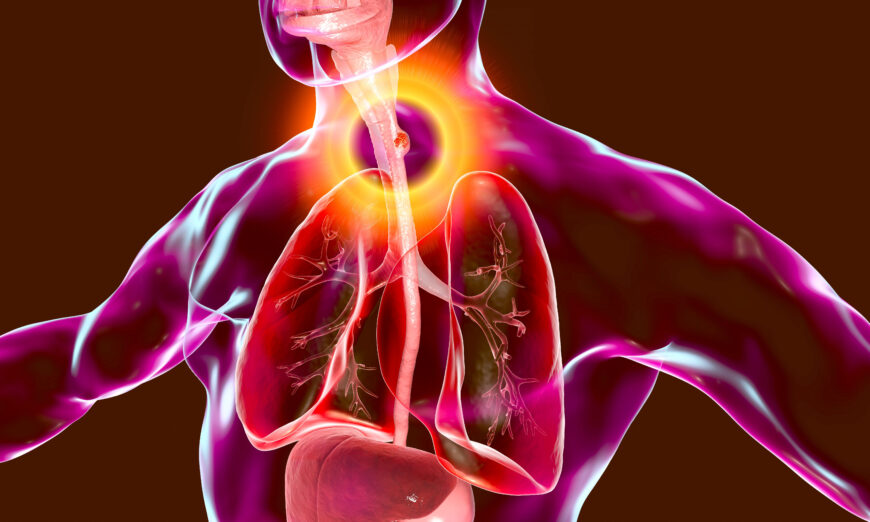While esophageal cancer is the eighth most common cancer worldwide, and the sixth leading cause of cancer-related deaths, it is one of the least studied cancers.
It sounds counterintuitive. However, there are many reasons why there is a lack of study, including this cancer’s aggressive nature, poor survival rate, and the great differences in how it presents across countries and even between sexes.
Esophageal cancer is not as common in the United States. However, a 2022 analysis presented at a conference found that from 2012 to 2019, the rate of esophageal cancer for people ages 45 to 64 almost doubled, based on 5 million people’s data in Florida.
Esophageal Cancer Is One of the Least Studied Common Cancers, 3 Reasons
By searching publications in the New England Journal of Medicine, the world’s leading medical journal, studies in esophageal cancer are far fewer than those in lung cancer.

There are multiple reasons for this:
1. Incidence rates are relatively low in the United States
The majority of esophageal cancer cases are outside of the United States. Esophageal cancer makes up only about 1 percent of cancer cases in the United States.
The National Institutes of Health (NIH) is the world’s largest public funder of biomedical research. However, because esophageal cancer is so uncommon in the United States, it is difficult to be granted funding from institutions like NIH to research it.
Also, because there aren’t many esophageal cancer patients in the United States, there is less motivation for pharmaceutical companies to develop new drugs targeting esophageal cancer.
2. Presents differently between sexes and among races, but root causes unknown
Most esophageal cancers can be classified as one of two types: adenocarcinoma or squamous cell carcinoma.
Squamous cell carcinoma is the predominant histological type worldwide. This form mainly occurs in the “Asian Esophageal Cancer Belt,” which includes China.
However, in countries like the United States, Australia, the UK, and Western Europe, adenocarcinoma incidence is higher.

Similar to other cancer types, esophageal cancer exhibits sex disparities in occurrence. The incidence of esophageal adenocarcinoma is about eight times higher (pdf) in men than in women. Sex is known to be an independent prognostic marker for squamous cell carcinoma but not for adenocarcinoma, with survival rates being higher in women.
Esophageal cancer affects races differently, as well. While nonwhite patients were more likely to develop squamous cell cancer or a tumor in the middle esophagus, white patients were more likely to develop adenocarcinoma or a tumor in the lower esophagus. The root causes for these differences are still unknown.
Esophageal cancer is very complicated and differs across sex, race, region, and socioeconomic status. Thus, as the number of patients in the United States is limited, and with so many factors to consider, it is hard to get statistically significant results.
3. High death rate
On average, according to a paper published in the World Journal of Gastroenterology, about 40 to 45 percent of patients die within a year after diagnosis, so it is hard to recruit patients for studies if they are too sick. This contributes to a limited number of eligible patients.
Can Esophageal Cancer Be Identified Early?
The deadliness of cancer depends on when it is found. If esophageal cancer is found while it is still localized, the patient has a 46 percent chance of survival for five more years. If it is found while it is regional, that chance drops to 26 percent, and if found while distant, only 5 percent of patients will survive five more years.
- Localized means that the cancer is growing only in the esophagus.
- Regional means that the cancer has spread to nearby lymph nodes or tissues.
- Distant means that the cancer has spread to organs or lymph nodes away from the main tumor.
Unfortunately, in the earliest stages when it’s easiest to treat, esophageal cancer has very few symptoms. Therefore, it is called a silent killer.
Can screening be done? In the United States, screening for esophageal cancer is not recommended, partially because the incidence is low; therefore, for society overall, it is not cost-effective at lowering risk.
Will There Be a Sharp Increase in Esophageal Cancer in the US?
The researchers who presented their findings at the 2022 Digestive Disease Week conference argue that more middle-aged persons should be checked for esophageal cancer in light of their study, as esophageal cancer may be increasing among middle-aged people.
That being said, the study’s findings should be analyzed with caution, as the study only included adults residing in Florida, meaning it’s not wholly representative of the population of the United States. For instance, the increase might be due to Florida’s growing population (it has grown by 14.6 percent in the last decade and growth accelerated during the pandemic). Florida’s late-night eating habits may also influence the increase; Miami is a late-night eating town compared to the rest of the country. More on this later.
What Are Common Risk Factors of Esophageal Cancer?
As mentioned, nearly half of the patients die within a year once they are diagnosed—which is why prevention is very important.
Smoking, alcohol, obesity, drinking hot tea, red meat consumption, poor oral health, low intake of fresh fruit and vegetables, and low socioeconomic status have all been associated with a higher risk of esophageal cancer, according to the World Journal of Gastroenterology paper.

5 Ways to Prevent Esophageal Cancer
There are a few things that you can do now to lower your chance of developing esophageal cancer.
1. Avoid eating late
When you eat late at night and then lie down, the contents of your stomach press harder against the lower esophageal sphincter. This can trigger gastroesophageal reflux disease (GERD), or acid reflux. Some ways to avoid this include:
- Waiting two to three hours after eating to go to bed.
- Not snacking late at night.
- Eating larger meals earlier in the day. Try to make your last meal small.
Many people love to have late-night dinners and drinks, especially while on vacation. Although having to restrain yourself from delicious food at night might be hard, it is rewarding to control your weight and prevent other diseases beyond esophageal cancer.
2. Avoid hot foods and liquids
Different people have different eating habits. I hear discussions about why Chinese people like drinking hot water. It can be relaxing and soothing. However, drinking very hot beverages may be associated with esophageal cancer risk.
Thermal irritation has long been known to be a risk factor. Back in the 1930s, after reviewing clinical records of 771 cases of esophageal cancer, New York physician W.L. Watson wrote that “thermal irritation is probably the most constant factor predisposing to the cancer of the esophagus.” This prevalence could explain why a large proportion of all cases of esophageal cancer affects populations in which drinking tea, coffee, or maté, or eating hot foods is common.
Decades later, this conclusion is supported by multiple studies. More recently, the World Health Organization, a 2018 Chinese study, and a 2019 Iranian study all hinted at the connection.
It should be noted that some studies used a temperature greater than which most people would normally drink liquids. Still, drink liquids at a reasonable temperature.
3. Avoid smoke and alcohol
Drinking alcohol and smoking are major risk factors for esophageal cancer, especially in Western populations, as established by many retrospective studies.
The observed association between smoking and adenocarcinoma risk is weaker than that for squamous cell carcinoma, while the effect of alcohol on adenocarcinoma is uncertain.
Notably, any level of alcohol consumption increases esophageal cancer risk. The more a person drinks, the higher their risk. Compared to no alcohol consumption, heavy drinking leads to a five-fold increased risk.
4. Beware of Barrett’s esophagus
One of my studies on esophageal cancer started with a patient with a family history of esophageal cancer. He originally had Barrett’s esophagus and later developed esophageal cancer.
Barrett’s esophagus—which usually results from acid reflux—is recognized as a risk factor for esophageal cancer. Acid reflux damages the esophagus, resulting in the lining thickening and turning red. Between 5 and 8 percent of persons with acid reflux develop cancer.
The sole indicator still effective for determining whether people are at an elevated risk of developing cancer is the presence of precancerous cells (dysplasia) in Barrett’s esophagus.
But don’t worry. The diagnosis of Barrett’s esophagus should not be a reason for alarm. If it coincides with high-grade dysplasia, your doctor might recommend a minimally invasive esophagectomy.
Furthermore, recent research (pdf) has shown that under the right conditions, Barrett’s esophagus can be made to regress after endoscopic ablative therapy.
5. Boost your immune system
Before I started my research in gastrointestinal cancer, I worked at a Chinese medicine hospital and heard a story from my supervisor about his friend, who happened to be my previous neighbor. He had developed esophageal cancer at a young age and was hopeless. He then took ginseng and had a fever for days. He lost consciousness and after he woke up, he was cancer free.
Ginseng is known to strengthen the immune system. But while my anecdote sounds like a fairy tale, I did find some studies that showed there is mounting evidence that ginseng has anticancer effects.
I am not encouraging readers to take ginseng to prevent esophageal cancer without consulting Chinese medicine doctors. Plus, different ginseng has different effects.
Takeaway
According to the study using electronic health records in Florida, esophageal cancer is on the rise among middle-aged Americans. Since this is a deadly cancer that is hard to diagnose early, be aware of any early signs, such as difficulty swallowing (dysphagia), weight loss without known reasons, chest pain, pressure or burning in your esophagus, and talk to your doctors as early as you can.
The most important thing you can do today is to have a healthy lifestyle and a positive outlook, get rid of bad habits, and manage stress to ensure you have a good immune system.
Please share this.
No comments:
Post a Comment